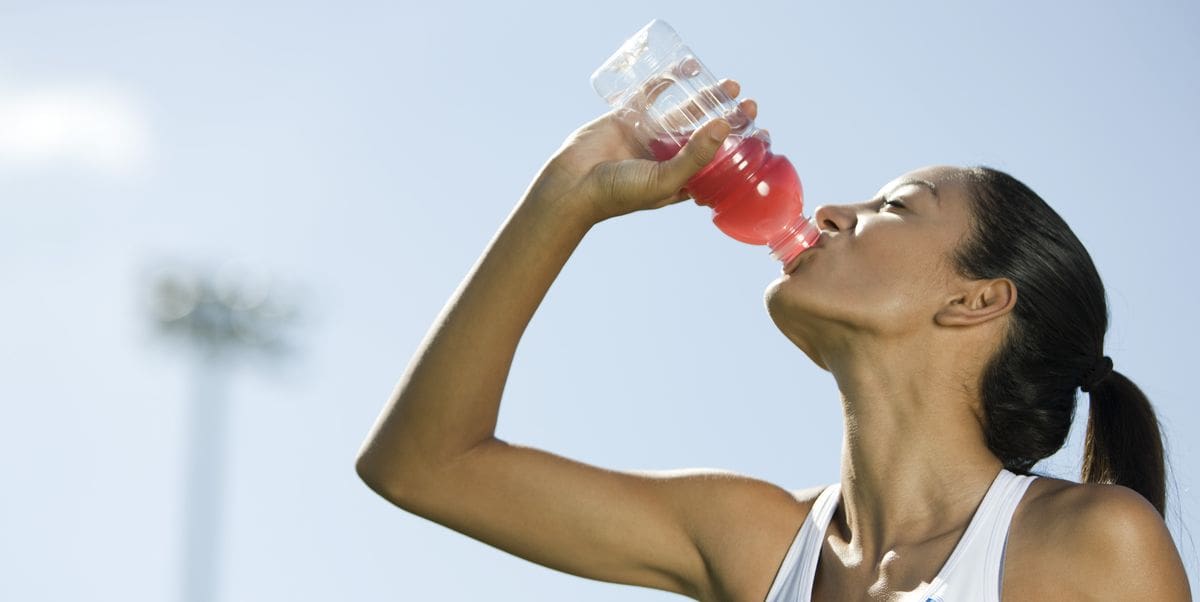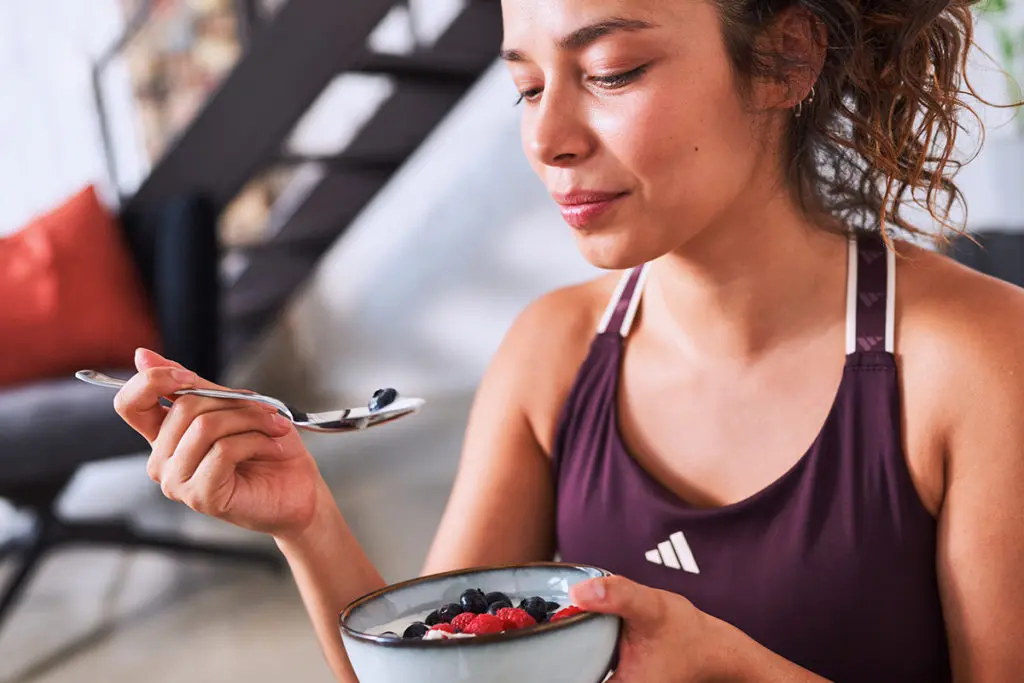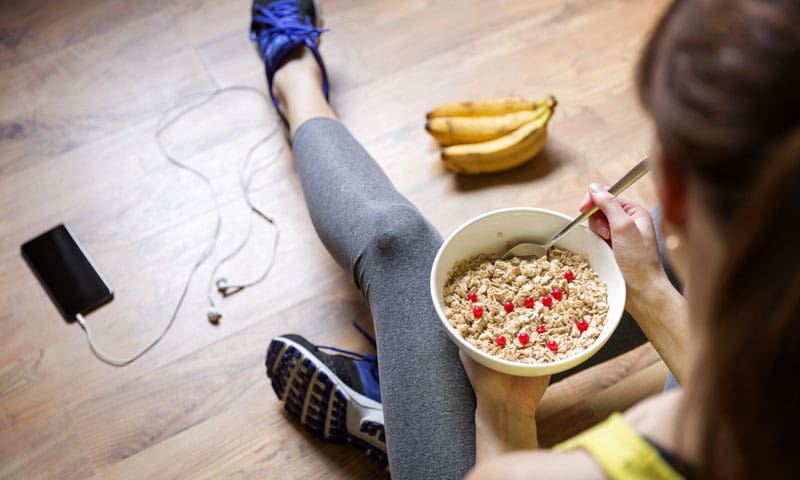Sports
8 Essential Recovery Nutrition Tips Every Marathoner Needs to Know


As a marathoner, the physical demands of training and racing can take a toll on your body. It’s essential to prioritize recovery nutrition to ensure that your body can bounce back and perform at its best.
From protein sources to hydration restoration, these eight essential recovery nutrition tips are crucial for marathoners looking to optimize their recovery and enhance their performance.
Understanding the importance of each tip and how it contributes to your overall recovery is key to staying at the top of your game.
Key Takeaways
- Prioritize high-quality, complete proteins for muscle repair and growth, including lean sources like chicken, turkey, fish, eggs, and dairy products, as well as plant-based options like quinoa, hemp seeds, and tofu.
- Include a mix of simple and complex carbohydrates for glycogen restoration, with simple carbohydrates like fruits or sports drinks for quick absorption and complex carbohydrates like whole grains, pasta, and potatoes for sustained energy.
- Consume protein within 30 minutes to an hour after the marathon to support muscle repair and growth, opting for high-quality sources like lean meats, eggs, and dairy products, as well as plant-based options like lentils, quinoa, and tofu.
- Incorporate anti-inflammatory foods into post-marathon nutrition, such as fruits and vegetables rich in antioxidants and phytonutrients, healthy fats like avocados, nuts, seeds, and fatty fish, and ingredients like turmeric, ginger, and green tea that have anti-inflammatory properties.
Protein Sources
When selecting protein sources for post-marathon recovery, it is essential to prioritize high-quality, complete proteins to support muscle repair and growth. After enduring the physical demands of a marathon, the body requires adequate protein to aid in the repair and rebuilding of muscle tissue. Opt for lean sources such as chicken, turkey, fish, eggs, dairy products, and plant-based proteins like quinoa, hemp seeds, and tofu. These options provide essential amino acids necessary for muscle recovery and growth.
Including a variety of protein sources in your post-marathon meals is crucial to ensure that you are getting a wide range of amino acids. Additionally, consuming carbohydrates alongside protein can enhance the rate at which protein is absorbed and utilized by the muscles. This can be achieved through meals like a turkey sandwich on whole grain bread, a protein smoothie with added fruits and vegetables, or a quinoa salad with mixed vegetables and a serving of grilled chicken.


Prioritizing high-quality, complete proteins in your post-marathon recovery meals will aid in optimizing muscle repair and growth, ultimately supporting your body’s overall recovery process.
Carbohydrate Replenishment
In the context of post-marathon recovery, ensuring adequate carbohydrate replenishment is vital for replenishing glycogen stores and supporting overall muscle recovery. After completing a marathon, the body’s glycogen stores become depleted. Carbohydrates are the primary source of energy for endurance exercise, and replenishing these stores is crucial for optimal recovery.
Aim to consume a mix of simple and complex carbohydrates to facilitate rapid glycogen replenishment. Simple carbohydrates, such as fruits or sports drinks, can be quickly absorbed and utilized by the body, while complex carbohydrates like whole grains, pasta, and potatoes provide a sustained release of energy.
Consuming carbohydrates in the first 30 minutes to an hour post-marathon, when the body’s ability to replenish glycogen is at its peak, is especially important. Aim for a carbohydrate intake of 1.0 to 1.5 grams per kilogram of body weight during this period. This can help kickstart the recovery process and ensure that your muscles have the necessary fuel to repair and rebuild.
Prioritizing carbohydrate replenishment as part of your post-marathon nutrition plan is essential for restoring energy levels and promoting efficient recovery.


Muscle Repair
How crucial is protein intake for supporting muscle repair in the post-marathon recovery process?
Protein is essential for repairing and rebuilding muscle tissue after the stress of a marathon. It provides the necessary amino acids that aid in the repair and growth of muscle fibers, helping marathoners recover faster and come back stronger.
To support muscle repair effectively, marathoners should consider the following:
- Protein Timing: Consuming protein within 30 minutes to an hour after finishing the marathon can kickstart the muscle repair process. This is a crucial window for nutrient absorption and muscle recovery.
- Protein Sources: Opt for high-quality protein sources such as lean meats, eggs, dairy products, and plant-based options like lentils, quinoa, and tofu. These sources provide a variety of essential amino acids necessary for effective muscle repair.
Proper protein intake is vital for marathoners looking to optimize their recovery and support muscle repair. By prioritizing protein consumption and choosing quality sources, marathoners can better prepare their bodies for future training and races.
Inflammation Reduction
Reducing inflammation is crucial for marathon recovery.


Anti-inflammatory foods can help alleviate muscle soreness and speed up the healing process.
Incorporating natural inflammation remedies into your post-marathon nutrition can significantly improve your recovery time.
Anti-Inflammatory Foods
To support recovery and enhance performance, marathoners benefit from incorporating anti-inflammatory foods into their nutrition plan. Consuming these foods can help reduce inflammation, promote healing, and support overall well-being. When planning meals, consider including the following anti-inflammatory options:
- Fruits and Vegetables: Opt for a colorful array of fruits and vegetables such as berries, cherries, leafy greens, and cruciferous vegetables like broccoli and Brussels sprouts. These are rich in antioxidants and phytonutrients that combat inflammation.
- Healthy Fats: Incorporate sources of healthy fats such as avocados, nuts, seeds, and fatty fish like salmon. These foods contain omega-3 fatty acids, which have been shown to possess anti-inflammatory properties and aid in recovery.
Recovery Time Improvement
Incorporating strategies to reduce inflammation can significantly contribute to improving recovery time for marathoners. By focusing on inflammation reduction, marathoners can experience faster recovery, allowing them to return to training sooner and perform at their best.
Consuming anti-inflammatory foods such as fatty fish, leafy greens, and berries can help combat inflammation. Additionally, incorporating turmeric, ginger, and green tea into their diet can further aid in reducing inflammation.
Post-workout, using foam rollers or receiving massages can also help alleviate muscle soreness and reduce inflammation. Adequate hydration and quality sleep are equally important in reducing inflammation and improving recovery time.
Natural Inflammation Remedies
Improving recovery time for marathoners can be achieved through the incorporation of natural inflammation remedies, which play a crucial role in reducing post-marathon muscle soreness and facilitating a quicker return to training. When seeking natural inflammation remedies, consider the following:
- Consuming anti-inflammatory foods, such as fatty fish, leafy greens, and berries, can help reduce inflammation and support muscle recovery.
- Incorporating turmeric and ginger into post-marathon meals or smoothies can aid in reducing inflammation due to their potent anti-inflammatory properties.
Additionally, prioritizing proper hydration and rest, and avoiding processed foods and excessive sugar, can further aid in minimizing inflammation and expediting the recovery process.
Antioxidant-Rich Foods
Consider adding a variety of antioxidant-rich foods to your diet to support your body’s recovery after marathon training and racing. Antioxidants are essential for combating the oxidative stress that occurs during intense physical activity. Including foods such as berries, dark leafy greens, nuts, seeds, and colorful fruits in your post-marathon meals can help neutralize free radicals and reduce inflammation, promoting faster recovery.
Berries, such as blueberries, strawberries, and raspberries, are particularly rich in antioxidants like vitamin C, flavonoids, and polyphenols, which can aid in repairing cellular damage caused by prolonged exercise.
In addition to fruits and vegetables, incorporating sources of omega-3 fatty acids, like salmon, chia seeds, and walnuts, can also contribute to your body’s antioxidant defense system. These healthy fats help reduce inflammation and support overall recovery post-marathon.
Furthermore, spices like turmeric, cinnamon, and ginger are known for their potent antioxidant and anti-inflammatory properties, making them valuable additions to your recovery meals.
Omega-3 Fatty Acids
Omega-3 fatty acids play a crucial role in supporting post-marathon recovery by aiding in the reduction of inflammation and promoting overall physiological restoration. These essential fats are vital for marathoners looking to enhance their recovery process and get back to training at their best.
Here’s how omega-3 fatty acids support your recovery:
- Reduced Inflammation: Omega-3 fatty acids have anti-inflammatory properties that can help reduce the muscle and joint inflammation commonly experienced after a marathon. This can lead to faster recovery and less discomfort during the post-race period.
- Improved Muscle Repair: Omega-3 fatty acids support muscle repair and growth, which can be beneficial for marathoners aiming to recover quickly and efficiently. By promoting muscle recovery, these fats can help you get back to your training routine sooner.
Incorporating omega-3 fatty acids into your post-marathon nutrition plan, whether through foods like salmon, chia seeds, or supplements, can be an effective way to support your body’s recovery process and prepare for future running endeavors.


Hydration Restoration
Hydration restoration plays a critical role in the recovery process for marathon runners.
Maintaining electrolyte balance and timing fluid intake are essential components to consider.
These points will be further discussed to provide practical insights for effective hydration restoration strategies.
Electrolyte Balance
Maintaining proper electrolyte balance is essential for marathoners to restore hydration and optimize performance during and after intense endurance exercise. Electrolytes such as sodium, potassium, calcium, and magnesium play a crucial role in regulating fluid balance, muscle function, and nerve signaling.
To ensure optimal electrolyte balance, marathoners should consider the following:


- Electrolyte-rich Foods: Incorporate foods high in electrolytes such as bananas, spinach, nuts, and seeds into your post-marathon meals to replenish essential minerals.
- Electrolyte Supplements: Consider using electrolyte supplements or sports drinks to replenish lost minerals during and after the marathon, especially if you are a heavy sweater or the race conditions are particularly hot and humid.
Maintaining electrolyte balance is key to preventing dehydration and muscle cramps, allowing marathoners to recover effectively and continue enjoying their freedom to run.
Fluid Intake Timing
To ensure optimal recovery and performance, marathoners should pay close attention to the timing of their fluid intake, as this plays a critical role in restoring hydration and supporting overall post-marathon recovery.
Rehydration should commence immediately after the race, with an emphasis on replenishing fluids lost during the run. It is advised to consume fluids containing electrolytes to aid in the rehydration process.
Following this initial rehydration phase, ongoing fluid intake should be spread throughout the day. Consuming small, frequent amounts of fluids rather than large volumes at once can enhance the body’s ability to absorb and retain the necessary fluids.
Timing fluid intake in this manner can help marathoners swiftly restore their hydration levels and support efficient recovery, ultimately facilitating their freedom to resume regular activities.


Electrolyte Rebalancing
Balancing electrolytes is essential for optimizing performance and recovery during marathon training and races. When it comes to electrolyte rebalancing, marathoners should keep the following in mind:
- Electrolyte Sources: Meeting your electrolyte needs can be achieved through a variety of sources, including sports drinks, electrolyte tablets, and certain whole foods. It’s essential to explore and find what works best for your body and preferences.
- Consider experimenting with different options during training runs to determine which source of electrolytes sits well with your stomach and enhances your performance.
- Remember that individual sweat rates and sodium losses vary, so it’s crucial to tailor your electrolyte intake based on your specific needs and the environmental conditions during your training and races.
Ensuring electrolyte balance is crucial for preventing cramping, sustaining energy levels, and supporting overall bodily functions. By understanding your body’s electrolyte requirements and experimenting with different sources, marathoners can better equip themselves for optimal performance and recovery.
Frequently Asked Questions
How Can I Incorporate Recovery Nutrition Into My Marathon Training Plan?
Incorporating recovery nutrition into your marathon training plan is crucial for optimizing performance and reducing the risk of injury. Focus on replenishing carbohydrates, proteins, and fluids within the first 30 minutes post-exercise to support muscle recovery and glycogen replenishment.
What Are Some Lesser-Known Sources of Protein for Marathon Recovery?
Some lesser-known sources of protein for marathon recovery include quinoa, tempeh, and Greek yogurt. These provide essential amino acids and aid in muscle repair and growth. Incorporating a variety of protein sources supports overall recovery and performance.
Are There Specific Foods That Can Help With Reducing Post-Marathon Muscle Soreness?
Specific foods like cherries, turmeric, and ginger have anti-inflammatory properties, aiding in reducing post-marathon muscle soreness. Additionally, incorporating protein-rich foods like salmon and quinoa can support muscle recovery and reduce soreness.


Can Certain Foods or Supplements Help With Reducing Inflammation After a Marathon?
Certain foods and supplements may help reduce inflammation after a marathon. Omega-3 fatty acids found in fish, turmeric, tart cherry juice, and ginger have shown anti-inflammatory properties. However, consult with a healthcare professional before adding supplements to your diet.
What Are Some Ways to Naturally Replenish Electrolytes After a Marathon?
Following a marathon, natural electrolyte replenishment can be achieved through consuming foods like bananas, avocados, and coconut water. These nutrient-rich options help restore balance and hydration, aiding in the body’s recovery process.


Hi, I’m Kyle Rivera, a news journalist and blog editor with the Daily Evening News. A TCU alum with a flair for storytelling, I spend my days uncovering impactful stories and my evenings exploring the realms of yoga, cycling, and whimsically bad poetry.
Travel is my escape; I’ve trekked from Tokyo’s neon lights to Iceland’s tranquil vistas. But no journey is complete without Mogli, my Golden Retriever, who’s redefining his breed standards in the most charming ways.
I love connecting with fellow travelers, yogis, cyclists, and anyone who enjoys a laugh at my poetic attempts. If you’re into stories that inspire, travel escapades, or just want to see what Mogli and I are up to, I’d love to hear from you on Instagram or Facebook. Let’s share tales and tips from around the globe!

